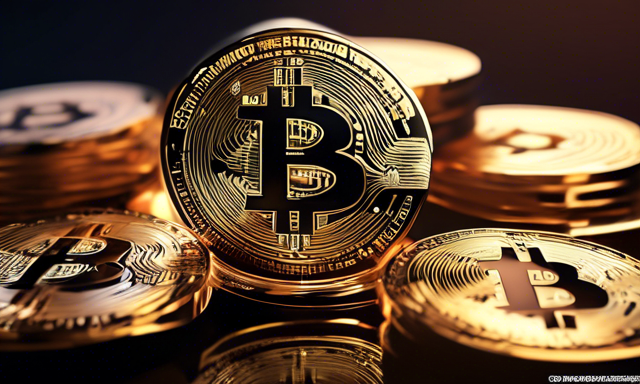Rumors Surrounding Trump’s Potential Bitcoin Strategy
There are rumors circulating that former President Donald Trump may announce his intention to make Bitcoin a strategic reserve asset for the United States, a move that could significantly impact the cryptocurrency landscape. According to Bitfinex, this potential decision may be unveiled at the 2024 Bitcoin Conference in Nashville, causing a buzz within the crypto community. The goal behind this proposal is to position the US as a leader in cryptocurrency adoption and regulation, leveraging Bitcoin’s decentralized and limited supply to enhance economic resilience and stability.
Global Crypto Regulation Shifts
If the US adopts Bitcoin as a strategic reserve asset, it could have far-reaching implications for global crypto regulation, policy, and perception. This move is likely to prompt other countries to develop more supportive regulatory frameworks, acknowledging the economic and geopolitical benefits of embracing digital assets. The international legitimacy of Bitcoin could lead to its inclusion in other nations’ reserves, sparking a competitive race among nation-states to accumulate the cryptocurrency. Additionally, this shift might drive the expansion of mining operations worldwide, enhancing the decentralization and security of the Bitcoin network while fostering economic and technological advancements globally.
Challenges and Potential Risks
Despite the potential benefits, there are significant challenges and risks associated with adopting Bitcoin as a strategic reserve asset. Implementing such a policy would require navigating a complex regulatory landscape and obtaining approval from various government bodies, including Congress and the Federal Reserve. There are also concerns regarding Bitcoin’s volatility and suitability as a reserve asset, along with the technical challenges of securely managing and storing large quantities of the cryptocurrency to prevent theft and loss.
Market Speculation and Reactions
Speculation surrounding Trump’s rumored announcement has already sparked interest and activity within the crypto market, with options volume rising in anticipation of the conference. If Trump does confirm his intention to make Bitcoin a strategic reserve asset, it could reshape the crypto landscape, leading to more favorable regulatory environments and accelerating mainstream adoption. Regardless of the outcome, the mere possibility of such a move underscores the growing importance of cryptocurrencies in the global financial system and the intricate relationship between politics and digital assets.
Broader Impact on the Market
The adoption of Bitcoin as a strategic reserve asset by the US could trigger a surge in demand for the cryptocurrency, driving up its price. Endorsement from one of the world’s largest economies would instill confidence in Bitcoin’s long-term value proposition, potentially attracting institutional and retail investors. This surge in demand could lead to a new bull market for Bitcoin, characterized by increased volatility as the market adjusts to higher demand and a strategic shift in US financial policy.
In addition to affecting Bitcoin, this move could bring substantial changes to the broader cryptocurrency market. The US adopting Bitcoin as a reserve asset would signal strong support for the cryptocurrency as a legitimate financial instrument, encouraging other countries to consider similar actions. This ripple effect could lead to greater adoption of Bitcoin and other cryptocurrencies, boosting their liquidity and stability globally. The increased demand for Bitcoin may spill over into other digital assets, such as Ethereum and Web3-focused chains, driving up their prices and market capitalizations.
Financial Products and User Benefits
If Bitcoin becomes a strategic reserve asset, it could pave the way for the development and approval of more crypto-based financial products, including Bitcoin and Ethereum ETFs. These financial instruments would offer investors a regulated and convenient way to gain exposure to cryptocurrencies without directly holding them. The increased legitimacy of Bitcoin might expedite the approval process for these ETFs by regulatory bodies, enticing a wider range of institutional investors to enter the market.
For crypto users, the adoption of Bitcoin as a strategic reserve asset could bring several benefits and opportunities. It would enhance the security and stability of Bitcoin investments, as government backing would reduce the perceived risks associated with holding digital assets. This could lead to increased usage of Bitcoin in everyday transactions, as more merchants and businesses would accept it as a form of payment. The broader acceptance and integration of cryptocurrencies into the financial system could spur the development of user-friendly wallets, exchanges, and crypto-fintech hybrid financial services, making it easier for individuals to manage and use their digital assets.
Geopolitical Ramifications
The adoption of Bitcoin as a strategic reserve asset by the US is likely to trigger significant shifts in crypto regulation and policy globally. Other nations would be compelled to reevaluate their stance on cryptocurrencies, potentially leading to more structured and favorable regulatory frameworks. Countries that have been cautious about cryptocurrencies may reconsider, recognizing the economic and geopolitical advantages of embracing digital assets. This reassessment could result in increased regulatory clarity and support for the crypto industry, fostering innovation, growth, and ensuring strong investor protections and financial stability.
Geopolitically, the US’s move could elevate Bitcoin to a new level of global importance, positioning it alongside traditional reserve assets like gold and foreign currencies. This development would prompt international financial institutions and policymakers to incorporate Bitcoin into strategic discussions and economic policies. Acceptance of Bitcoin by a major global power could legitimize the cryptocurrency as a valuable asset, reducing skepticism and stigma surrounding digital currencies. This shift in perception could lead to a more integrated global financial system where digital assets play a central role, facilitating cross-border transactions and improving financial inclusion.
The US’s adoption of Bitcoin could inspire other nations to follow suit, resulting in a domino effect of increased adoption and integration of cryptocurrencies into national reserves. Countries seeking to hedge against inflation and currency devaluation might find Bitcoin an attractive addition to their reserves, leading to a competitive race among nations to accumulate the cryptocurrency. Smaller and emerging economies could leverage Bitcoin to enhance their presence in the global financial landscape, using it to attract foreign investment and promote economic growth.
This strategic reserve status for Bitcoin could accelerate the establishment and expansion of mining operations globally. Nations might invest in domestic mining capabilities to secure a stable and sovereign supply of Bitcoin, leading to increased geopolitical significance for countries with abundant natural resources and renewable energy. Countries with favorable regulatory environments and technological infrastructure could emerge as attractive hubs for mining activities, stimulating technological advancements and creating economic opportunities.





 By
By
 By
By



 By
By